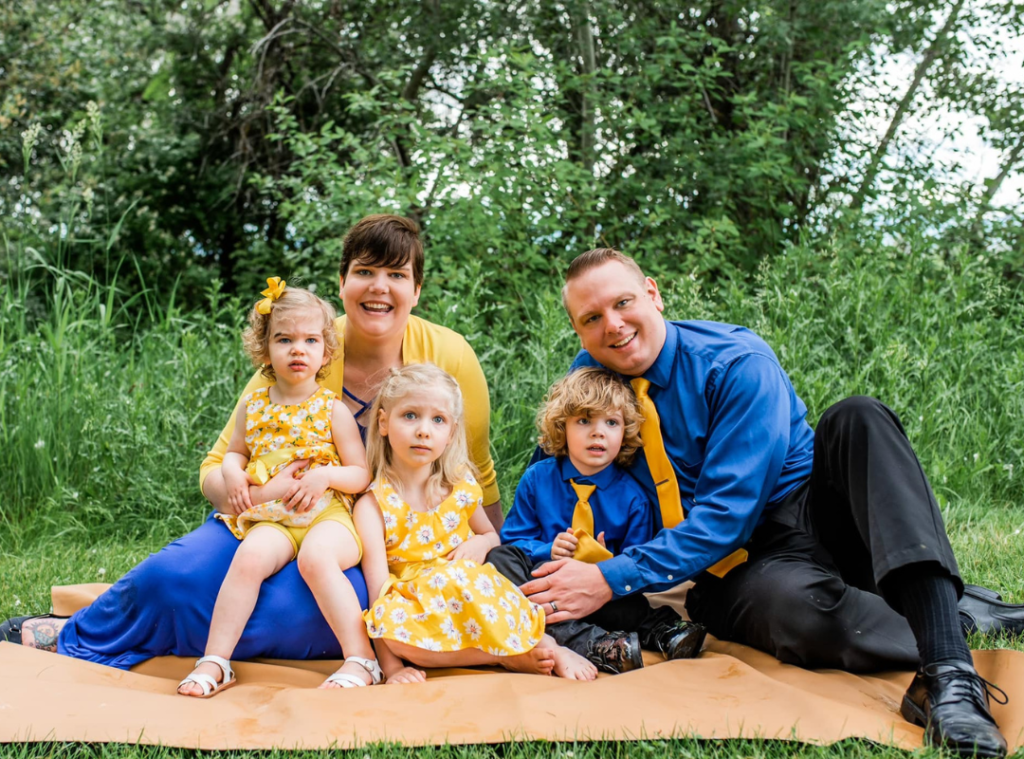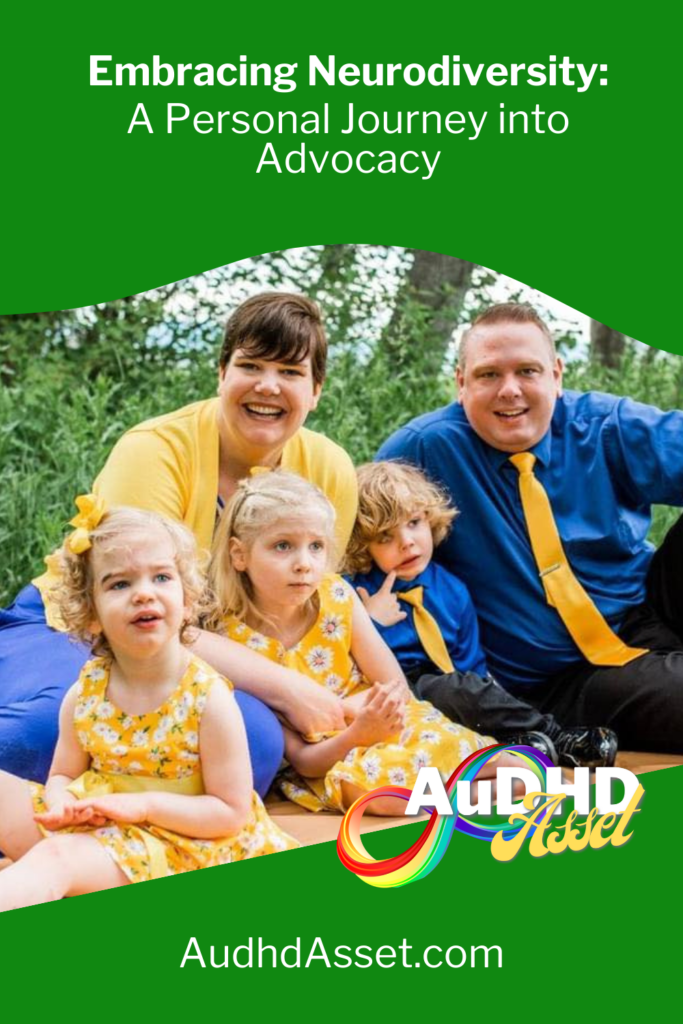Who was I eight years ago? Well I was a new mom to a beautiful baby girl.
Before becoming a parent and really for a few years into parenthood I was naive about a lot of aspects of what it meant to parent. I had a lot of unrealistic expectations and misunderstandings about children, parenting, and especially disability, ADHD, Autism, etc. Within the last years I’ve learned my 3 children are all autistic and adhd, I am autistic and adhd, my husband is adhd, and what I thought I knew about autism, adhd, neurodiversity and disability was severely lacking. I had not heard about neurodiversity until it was suggested that my daughter be evaluated for Autism.
What is neurodiversity?
Neurodiversity describes the idea that people experience and interact with the world around them in many different ways; there is no “right” way of thinking, learning, and behaving.
When my daughter was 3 years old, after being in speech therapy for a year, and after starting occupational therapy for a couple months, it was suggested that an autism evaluation would be good. I had some experience with Autism before this but always adults and adults with high support needs. I didn’t really have experience with autistic kids. I only knew what were stereotypical signs which were not exactly how traits were presenting in my daughter, so I was hesitant.
ADHD on the other hand, I had more experience with, two of my brothers were diagnosed with ADHD as kids. Both older than me I saw, from my perspective, a lot of their struggles and behaviors. I thought that meant I understood ADHD and signs/traits. I was wrong.
The Importance of Embracing Diverse Neurological Experiences.
Embracing how my kids think, learn, experience the world, was the top of my priority list as I had kids and each were diagnosed with Autism and ADHD. I wanted to make sure I gave them each the time, attention, and accommodations they needed but doing so meant understanding what Autism, ADHD, and neurodiversity are. Understanding each diagnosis not only helped me start to understand my kids’ needs, but also my own.
The unique neurodiversity among individuals contributes to the rich tapestry of human experiences. It’s important to recognize and celebrate the various ways individuals perceive, interact with, and navigate the world. In embracing neurodiversity, we foster inclusivity and create environments that allow for different cognitive processes. Sharing personal experiences and thoughts about neurodiversity can be a powerful way to break down stigmas and misconceptions. It opens up conversations that lead to increased awareness, empathy, and acceptance.
 Highlighting the Beauty of Neurodivergent Minds
Highlighting the Beauty of Neurodivergent Minds
To advocate for neurodivergent individuals and neurodiversity we can find ways to highlight how neurodivergent minds are beautiful and unique. By sharing personal stories, discussing triumphs, challenges, and the distinctive qualities.
By educating others about different neurodivergent diagnoses, emphasizing the positive aspects and dispelling myths and stereotypes we can foster better understanding of how neurodivergent minds contribute to a more diverse and enriched society.
The Motivation to Become an Advocate
Why did I decide that advocating for neurodivergent individuals was important? The world is not built for inclusion. Within the United States we can see that as we’re still battling certain social rights that give equality to the differences we can see. Removing women’s rights, forcing educational standards that fit a Christian perspective, fighting same-sex marriage, fighting immigrant rights, all of these are perfect examples of how we are not yet an accepting, understanding, and inclusive society.
When it comes to differences that are not seen like the color of your skin, the battle is that much more complicated. If I tell someone how anxiety ridden I become when talking on the phone I have been told time and time again “get over it” you can “try harder” and “that’s an excuse,” because to that person it’s not hard. It’s not debilitating to simply call and make an appointment. Instead of being open-minded and accepting my perspective my experience is belittled, invalidated, and ignored. That’s not inclusion.
I grew up undiagnosed so already the experiences my children will have growing up will be different. When they have challenges we will know they are disabled and we will understand accommodations are needed. I didn’t have that. I had challenges and I felt inadequate because I felt like I was like everyone else, I should be able to do it, when in reality I was different.
Breaking Down Barriers
Breaking down barriers for neurodivergent individuals requires a concerted effort to create a more inclusive and understanding society.
Addressing Societal Stigmas and Discrimination
It’s crucial to address societal stigmas around neurodivergent individuals to foster a more inclusive society. What stigmas are there towards neurodivergent individuals?
- Neurodivergent individuals may face stereotyping, people make assumptions based on their condition rather than recognizing their unique abilities and strengths. This is seen often with Autism. Someone may be considered “low functioning” and so people do not presume competence, leaving them out of opportunities, or simply assuming they do not understand.
- An employee with ADHD, consistently performing well, meets criteria for a promotion, is passed up because it’s assumed they will not be able to handle the increased responsibilities. Same scenario for an Autistic employee, consistently performing well, meets criteria for a promotion, is passed over because it’s assumed they will not be able to handle social nuisance and demands of the position.
There are a lot of direct and indirect scenarios that can be played out that highlight how neurodivergent individuals can be discriminated against due to societal stigmas.
 The negative effects of stigma and discrimination on neurodivergent individuals can have profound and lasting impacts on their well-being. This can happen by either contributing to the development of or exacerbation of mental health issues, including anxiety, depression, and low self-esteem. Neurodivergent individuals may experience social isolation for fear of judgment or rejection. Constant exposure to negative attitudes and discrimination can erode self-confidence and contribute to low self-esteem. Teachers and peers may hold biased views, affecting the individual’s academic progress and hindering their access to necessary resources and support. Over time, individuals may internalize the negative societal attitudes towards neurodivergence, leading to a sense of shame or self-blame for their differences.
The negative effects of stigma and discrimination on neurodivergent individuals can have profound and lasting impacts on their well-being. This can happen by either contributing to the development of or exacerbation of mental health issues, including anxiety, depression, and low self-esteem. Neurodivergent individuals may experience social isolation for fear of judgment or rejection. Constant exposure to negative attitudes and discrimination can erode self-confidence and contribute to low self-esteem. Teachers and peers may hold biased views, affecting the individual’s academic progress and hindering their access to necessary resources and support. Over time, individuals may internalize the negative societal attitudes towards neurodivergence, leading to a sense of shame or self-blame for their differences.
That internalized ableism, shame, and self-blame is what many who are late diagnosed or undiagnosed into adulthood deal with daily. I was not diagnosed until 36 years old and the amount of shame I’ve dealt with over challenges I’ve faced my whole life is traumatic. Since the diagnosis I’ve been able to release a lot of that shame for understanding and acceptance.
Advocating for Neurodivergent Voices to be Heard
The first step to advocacy and inclusion programs, no matter the environment you can be at school, work, or community programs, is to listen and learn from those who are neurodivergent. Listen to those who grew up with a diagnosis and understand their perspective on therapies, how they were treated, how parenting styles worked or did not work for their brains. Also, listen to those who were late diagnosed, grew up not knowing there was a difference in their brain, but still dealing with challenges daily. Learn from different perspectives and find ways you can be open-minded and accommodating to those around you.
Inspiring Others to Join the Neurodiversity Advocacy Movement
How can you encourage others to become advocates for inclusivity, understanding, and acceptance of neurodivergent individuals?
- Organize workshops, webinars, or informational sessions to educate people about neurodivergent conditions and the strengths that come with neurodiversity.
- Encourage neurodivergent individuals to share their stories, challenges, and achievements to inspire others and break down stigmas.
- Organize community events that celebrate neurodiversity. This could be art exhibits, performances, or collaborative projects that involve neurodivergent individuals.
- Partner with neurodiversity advocacy organizations to amplify your efforts.
- Foster supportive networks and communities where individuals can share resources, experiences, and advice. Building a sense of belonging can empower people to join the advocacy movement.
Remember that fostering change takes time, and small actions lead to significant impacts. By creating a supportive and inclusive environment, you can inspire others to join the neurodiversity advocacy movement and contribute to a more understanding and accepting society.



